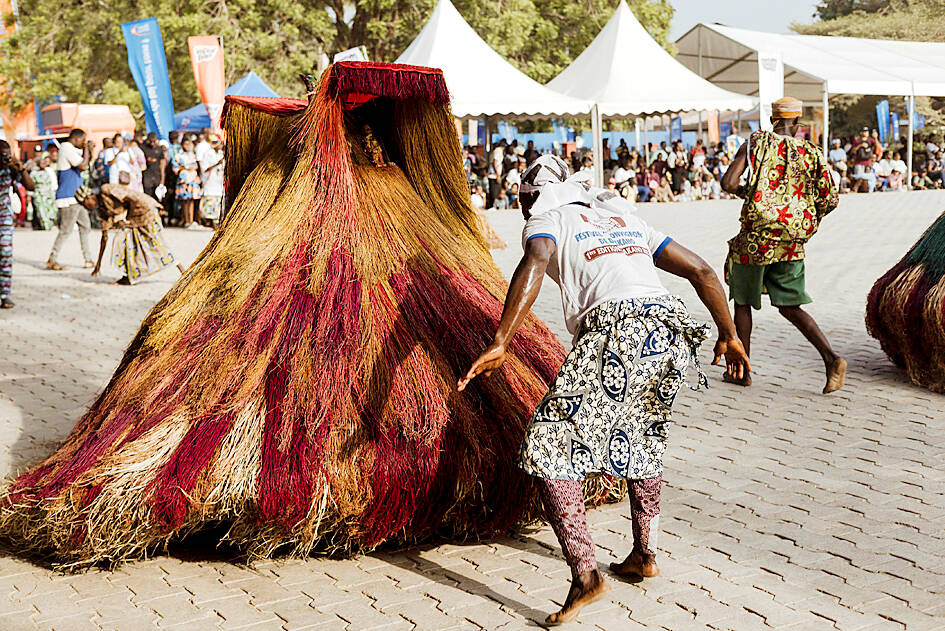The banks and delta of the Mono River in Benin are home to mangrove swamps that harbor fish and rare wild birds — and some are deemed sacred. The government has tried to protect them by imposing bans on overfishing and felling for firewood, but it has discovered that voodoo is more powerful than threats and is now seeking to co-opt traditional elders into its conservation plans.
In the southern village of Gogotinkpon, which lives off fishing in Lake Aheme, locals regularly turn to the deities to help mark off stretches of mangroves as sacred areas. To the rhythm of drums and gongs, they swirl and dance before voodoo masks in ceremonies to honor Zangbeto, the guardian of the night.
“This will allow the fish to multiply in peace and allow us to survive too,” said Antoinette Gnanlandjo, 70, who took part in one such ritual in a large square on the shores of the Aheme, Benin’s second-largest lake.

Photo: AFP
She is a follower of voodoo, an animist practice based on respect for nature, ancestors and invisible forces. Such ceremonies are common in villages in the 346,000-hectare Mono Biosphere Reserve on either side of the Mono River, which marks the border between Benin and Togo and is a magnet for nature-loving tourists.
Mangroves are tropical trees that have the unusual ability of thriving in brackish or salty water. They suck up planet-heating carbon and their underwater roots stop the land washing away. In Benin, this precious and fragile ecosystem is threatened by deforestation, coastal urbanization, pollution, overfishing and climate change, local communities and non-governmental organizations said. So the villagers turn to invisible powers for assistance.
During the ceremony Gnanlandjo attended, they fashioned two fetishes out of raffia, which a delegation of dignitaries — traditional leader Wilfreid Mesah, three villagers initiated into voodoo, two researchers and a red mask representing thunder — then took into the mangrove swamp by canoe. Chanting traditional songs, they tied the fetishes to the branches to ward off intruders intent on fishing or cutting into the mangroves for firewood.

Photo: AFP
“If someone tries to cut these branches, the vodun will whistle and stop them immediately. They’ll be stuck here. Then we voodoo dignitaries will come to find out what’s going on,” Mesah said.
He added that Zangbeto had stopped intrusions by four people in the past two decades, which showed it was effective. Anyone caught red-handed has to make offerings to the deity.
That could mean “a sheep, a pig, red oil, cash worth 50,000 CFA francs [about US$80] , palm wine or many other things,” Mesah said “Otherwise, you risk losing your life.”
Fear of divine punishment is more effective in protecting mangroves in the Mono nature reserve than any government bans, Juste Djagoun of environmental charity Eco-Benin said.
So the government plans to strengthen the role of traditional elders in the national plan to save the country’s mangroves and the wildlife they harbor. This could also help preserve ancient voodoo rites, which are not written down, but are transmitted orally from one generation to the next, said Senankpon Tcheton, a Beninese researcher in social and environmental sciences at the University of the Witwatersrand in South Africa.
The traditions are in danger of disappearing as their initiates die off or migrate and society is influenced by other religions, he said.

The Burmese junta has said that detained former leader Aung San Suu Kyi is “in good health,” a day after her son said he has received little information about the 80-year-old’s condition and fears she could die without him knowing. In an interview in Tokyo earlier this week, Kim Aris said he had not heard from his mother in years and believes she is being held incommunicado in the capital, Naypyidaw. Aung San Suu Kyi, a Nobel Peace Prize laureate, was detained after a 2021 military coup that ousted her elected civilian government and sparked a civil war. She is serving a

REVENGE: Trump said he had the support of the Syrian government for the strikes, which took place in response to an Islamic State attack on US soldiers last week The US launched large-scale airstrikes on more than 70 targets across Syria, the Pentagon said on Friday, fulfilling US President Donald Trump’s vow to strike back after the killing of two US soldiers. “This is not the beginning of a war — it is a declaration of vengeance,” US Secretary of Defense Pete Hegseth wrote on social media. “Today, we hunted and we killed our enemies. Lots of them. And we will continue.” The US Central Command said that fighter jets, attack helicopters and artillery targeted ISIS infrastructure and weapon sites. “All terrorists who are evil enough to attack Americans are hereby warned

Seven wild Asiatic elephants were killed and a calf was injured when a high-speed passenger train collided with a herd crossing the tracks in India’s northeastern state of Assam early yesterday, local authorities said. The train driver spotted the herd of about 100 elephants and used the emergency brakes, but the train still hit some of the animals, Indian Railways spokesman Kapinjal Kishore Sharma told reporters. Five train coaches and the engine derailed following the impact, but there were no human casualties, Sharma said. Veterinarians carried out autopsies on the dead elephants, which were to be buried later in the day. The accident site

RUSHED: The US pushed for the October deal to be ready for a ceremony with Trump, but sometimes it takes time to create an agreement that can hold, a Thai official said Defense officials from Thailand and Cambodia are to meet tomorrow to discuss the possibility of resuming a ceasefire between the two countries, Thailand’s top diplomat said yesterday, as border fighting entered a third week. A ceasefire agreement in October was rushed to ensure it could be witnessed by US President Donald Trump and lacked sufficient details to ensure the deal to end the armed conflict would hold, Thai Minister of Foreign Affairs Sihasak Phuangketkeow said after an ASEAN foreign ministers’ meeting in Kuala Lumpur. The two countries agreed to hold talks using their General Border Committee, an established bilateral mechanism, with Thailand